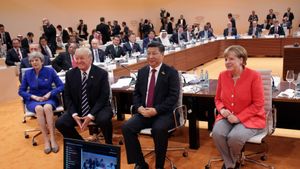Outgoing Senate Minority Leader Mitch McConnell of Kentucky has announced his new role as chairman of the Senate Appropriations Subcommittee on Defense. This decision marks a significant shift as he prepares to step down from his long-standing position as the Senate Republican leader, having served for 16 years. McConnell has made it clear he intends to use this position to advocate for increased military spending as part of his broader agenda to address perceived threats from adversaries such as Russia, China, and Iran.
At 82 years old, McConnell's leadership role has seen him navigate through tumultuous political waters, especially during periods of heightened partisan conflict. He successfully managed to keep the Senate Republican conference united behind numerous policy initiatives during his tenure. His new focus will revolve around ensuring adequate defense funding, echoing the sentiment among many GOP leaders who believe national security should be prioritized.
McConnell's appointment to oversee defense spending will entail significant responsibilities. The senator is known for his strong stance on military matters and has consistently pushed policies aimed at bolstering U.S. defenses. The subcommittee he will chair is responsible for determining how appropriated funds are allocated within the Department of Defense, influencing everything from recruitment budgets to equipment purchases.
His leadership on this subcommittee highlights his effort to maintain influence and facilitate continuity within the party as he transitions away from leadership. His predecessors often took on significant roles after stepping down from their primary leadership positions, and McConnell appears to be following suit. By enhancing his congressional role within the Appropriations Subcommittee, he can continue to shape military policy and allocate funds effectively.
McConnell's track record demonstrates his commitment to ensuring the military is well-equipped. This is especially relevant as tensions grow globally, requiring decisive and thoughtful budgeting for the United States’ national defense infrastructure. His experience and longstanding connections within the Senate will help him navigate the complex realities of military spending and appropriations.
Despite stepping down from the leadership mantle, McConnell remains one of the most powerful figures within the GOP. His appointment to the subcommittee is widely interpreted as his way of ensuring the GOP continues to advocate for its traditional stances on defense and military readiness.
The approaching transition also raises questions about the future direction of the Republican Party. McConnell has been instrumental in shaping legislative agendas during both Republican and Democratic administrations. His signature on defense spending will likely reflect deeply held beliefs about maintaining military superiority. That said, his role as chairperson will also require him to address challenges posed by budget constraints and calls from some factions for reduced military expenses.
His announcement has sparked discussions among party members about future leadership paths and the priorities they will champion moving forward. With 2024 fast approaching, how McConnell navigates budgetary discussions will likely influence the prevailing themes within the Republican platform as they shape their campaign strategies leading to the next election.
McConnell's new role coincides with broader national conversations about defense expenditure, particularly as the Biden administration seeks to make significant policy changes across various sectors, including military funding. The interplay between McConnell's advocacy for more funding and the presidential agenda will be watched closely as the nation’s defense policies evolve.
Expectations are high as McConnell looks to implement strategic changes within the defense budget. His supporters believe his experience will enable him to effectively respond to the ever-changing geopolitical landscapes. The reality of global threats is prompting calls from both sides of the aisle to reassess and adapt military strategies, and McConnell seems prepared for those challenges.
Overall, by taking on the chair of this subcommittee, McConnell not only secures his legacy within the party but also reinforces the dominance of defense spending as a central issue for Republicans. The coming months will demonstrate how he balances tradition with the demands of contemporary national security challenges, ensuring the military readiness the country’s leadership insists is necessary.



